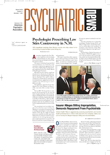Could it be that the 19th-century French sociologist Emile Durkheim was right?
He reported that when a society is threatened by external forces or is overwhelmed by a major event, people in that society tend to stick together, and that sticking together can also mean committing fewer suicides.
Indeed, suicide rates dropped during World War I and World War II, both among men and women, and not just in countries that participated in those wars, but in some others as well.
The American suicide rate fell after the assassination of President John Kennedy in 1963.
And now a British psychiatrist has reported in the September British Journal of Psychiatry that suicide rates plummeted in Britain in the wake of the tragic events of September 11, 2001.
Not surprisingly, the scenes of homicide-suicide bombers attacking the World Trade Center in New York City, as well as the scenes of people leaping to a certain death from the trade center towers, were shown over and over on British television, just as they were on American television. Subsequently, Emad Salib, M.D., a Liverpool University psychiatrist, wondered: Did the repeated showing of these scenes have any influence on people in Britain who were harboring homicidal or suicidal ideas at the time?
He obtained data from Britain’s Office for National Statistics documenting the number of homicides and the number of suicides in England and Wales from 1979 through 2001. First he compared the number of homicides in September 2001 with that of the previous 22 Septembers. He found no statistically significant difference. He thus concluded that the excessive 9/11 exposure had had no impact on those Brits who had contemplated homicide at the time. He then compared the number of suicides in September 2001 with that of the previous 22 Septembers. He found that the number of suicides in September 2001 was lower than the number in any of the previous Septembers—a highly significant difference statistically.
He also discovered that the number of suicides in September 2001 was significantly lower than the number in other months in 2001, and on September 11, 2001, only eight suicides occurred in England and Wales, compared with a daily average of 14 for 2001. Thus, the excessive coverage of 9/11 appears to have influenced the way the British think of suicide around the time of 9/11, and it appears to have helped deter them from taking action, Salib concluded.
But why might excessive exposure to acts of suicide have had such an effect? Salib contends that the explanation lies with the 19th century French sociologist Emile Durkheim.
“The finding of this study,” he wrote in his study report, “supports Durkheim’s theory that periods of external threat create group integration within society and lower the suicide rate through the impact on social cohesion. It also supports Durkheim’s views that ‘imitation’ does not significantly affect suicide rates, a view that is not shared explicitly by modern sociologists.”
Br J Psychiatry 2003 183 207
